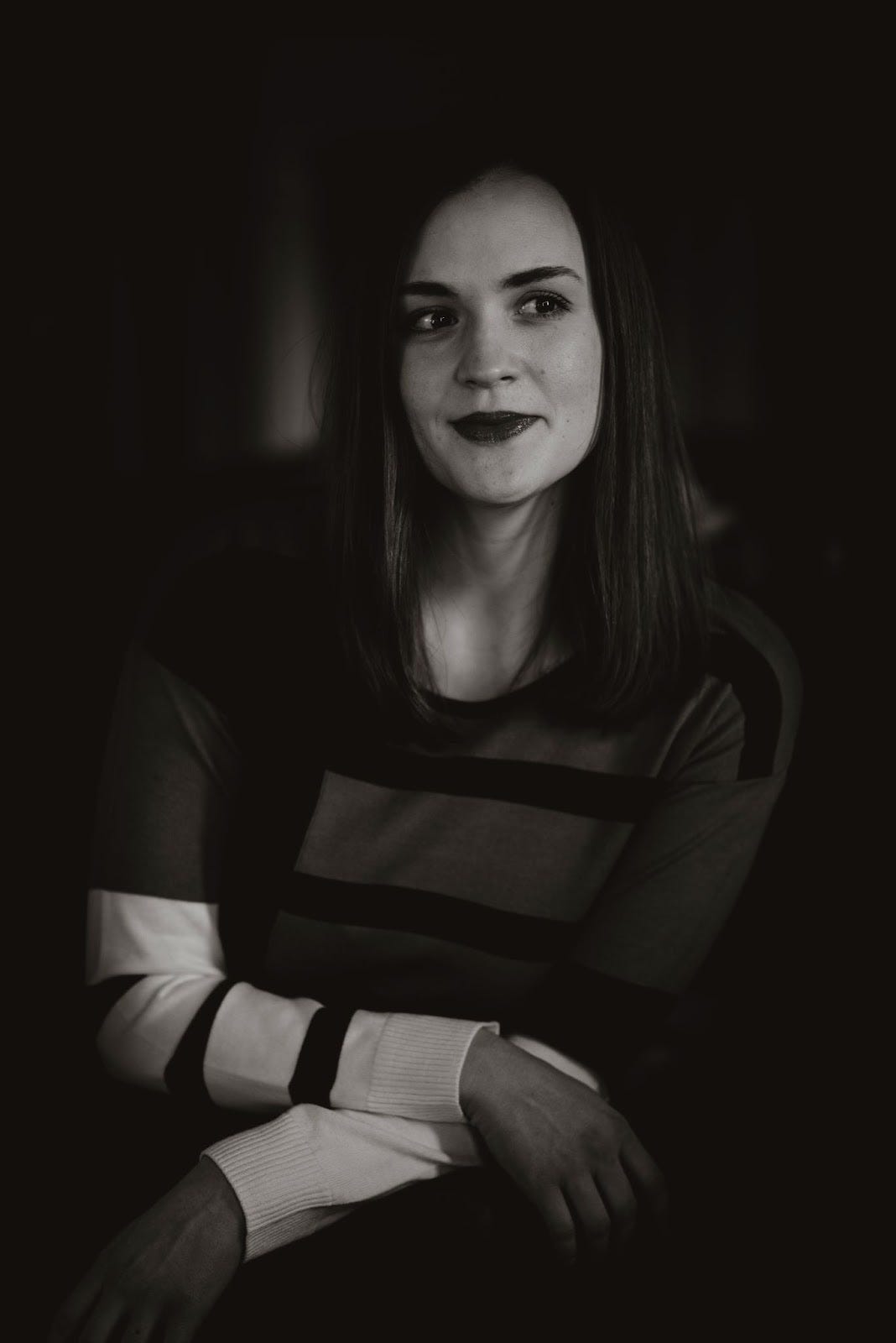No Poor Among Us: Jenna Carson
An interview with Jenna Carson, the first Mormon chaplain in the US federal prison system.
A series in which we interview and amplify marginalized voices within The Church of Jesus Christ of Latter-day Saints.
The purpose of this series is to create a space for various perspectives that are not often considered “mainstream Mormon.” In order to amplify these voices, the format will be more or less a transcript so the reader can get a feel for the interviewees’ passions and perspectives.
Today, I am sharing an interview with Jenna, the first Latter-day Saint chaplain in the US federal prison system.
After Jenna Carson began her master’s degree at Harvard Divinity School in 2015, chaplaincy lit up her soul. It led her on a five-plus year uphill battle with Church systems of authority as she worked toward policy change regarding women and military chaplaincy.
Chaplains work in medical facilities, universities, corporations, prisons, and the military. Previously, to be a chaplain endorsed by The Church of Jesus Christ of Latter-day Saints, a chaplain needed to be endowed, hold a temple recommend, pass a series of ecclesiastical interviews, and, in the case of military chaplaincy, be married and ordained to the priesthood. Since women are currently not ordained to the priesthood, military chaplaincy has been unavailable to Latter-day Saint women.
Can you share your journey of getting a military chaplaincy endorsement?
J: I searched the Church website and realized it mentioned priesthood holders becoming military chaplains. Since I'm not ordained, I knew this could be a sticking point. I contacted the director of Military Relations and Chaplain Services for the Church, asking him to endorse me. When the answer was “no,” I kept calling back and asking. To give the director credit, he was willing to have conversations with me. After a few years of back and forth, he said I’d have to take my request to the prophet, write him a letter. But at the time President Monson was pretty ill and the timing did not feel right.
After graduating with my master’s in 2018 and receiving further spiritual impressions, I ended up writing the letter. By then, President Nelson was the prophet. The day I wrote the letter was one of the most amazing experiences of my life. When I woke up that morning, the line that popped into my mind was, “You're writing the letter today.” Then God gave me the words—they flowed. I ran that letter to the mailbox with so much joy. I remember skipping after mailing it. I had a good feeling, like President Nelson was going to respond well.
It took a few months for the letter to get into his hands. In December 2018, the director called and told me President Nelson and the other apostles prayed about my request—and approved it. I was so excited. But soon after, the director mentioned my divorce and said his committee would have to think about whether or not they would approve me. When I had written the letter, I was married, but by the time the decision was made, I had been through a quick divorce after years of marital struggle. I kept thinking: since I was divorced by the time President Nelson prayed about my request—and God knew I was divorced when President Nelson prayed—why would that answer change?
I waited another few months. The director contacted my stake president, who told him he thought military chaplaincy “would be really difficult as a single person.” Up to that point, I’d felt nothing but support from my stake president, so that was hurtful. Ultimately, the director decided not to endorse me. “If you remarry, let us know,” he said.
I felt incredible pain. I knew I could write another letter to President Nelson, and I believed that if I explained to him what happened, he would help me. But I was also aware that there are millions of people in this Church and I never wanted this to be a self-indulgent ego project. I decided to let it go again. The Spirit helped me with that. A year later—early 2020—I had a strong spiritual impression, “It’s time to ask again.” So I called the director again and said,“If you won't endorse me for Active Duty, will you endorse me for the Reserve?” It didn’t go well. He said, with what sounded to me like exasperation and frustration and chastisement, “We need to stick to the guidelines that the Lord has set.” I started to cry. Between sobs, I asked, “Brother [name redacted], have you prayed about this?” There was a pause. And I have to give it to him, he answered me honestly. He said, “No, I haven't prayed about it.”
We got off the phone, and I cried for what felt like hours. I knew my marital status had nothing to do with my ability to be a good chaplain. I asked my then-boyfriend for a blessing of comfort. A line in that blessing struck me: “You can change the Church, but you don't have to.” That was freeing. This struggle for change had been a burden in my life, and something in that moment just lifted. I don't have to do this. I don't have to stay with this. My worth is the same. God's not expecting me to do this. But if I want to, I can. It didn't make the chaplaincy part easier, but it made my relationship with God easier. It felt like a message that God didn't expect me to sacrifice my well-being for this church.
After getting that blessing and asking the director about the Air Force Reserve, the pandemic hit, and everything slowed down. The director said he would take my request to the committee, but it took almost a year.
What did you do in the meantime?
J: I taught yoga and I wrote a lot. I processed a lot of hard stuff. Then I worked as a hospital chaplain. I couldn't afford to wait to hear back on what the Church was going to do. Plus, the Reserve is not enough for a career. It's one weekend a month and a few weeks in the summer. Hospital chaplaincy was an amazing experience, but I knew I didn't want to do it forever. One day while fasting, I prayed and asked God, “What is the next step?” Two words came to mind: prison chaplaincy.
I googled it. There was an opening at a federal prison. I didn't know if the director would endorse me (he’s the only person that can endorse chaplains for the Church). So I called him, and he was a little hesitant. He was worried about what it would mean for a Latter-day Saint woman to be a chaplain for the Federal Bureau of Prisons. He asked, “Are they going to accept you? Since you don’t have the priesthood, are they going to allow you to do it?” So I called a high-up chaplain in the Bureau of Prisons and asked him straight up. He was so encouraging. He said, “We need women chaplains, and we don't have anybody from your religion. Apply!” So the director gave me the endorsement, I applied, and the Bureau hired me.
I ended up in a men’s prison, which is not what I expected (I originally applied to a women’s). It’s intense. The learning curve has been steep. It wasn’t my plan, but I feel like God was preparing me for this all along.
Did you ever hear back from the committee?
J: The committee took my request to President Nelson, and while I was in the process of getting into the prison system, I got the endorsement for the military, regardless of marital status, but only for the Reserve. The director said, “Try out the Reserve for a few years, and if it goes well, you can apply to go Active Duty.” I started working with a recruiter from the Air Force. I thought I’d do full-time prison chaplaincy and serve in the Reserve on the side. But then I started the prison job and it took all my energy and stamina. I realized it wasn’t the right time to add another thing to my plate.
Even now, I pray about it from time to time, but I’m not getting the green light from the Spirit. I’ve agonized over this. Why did I work so hard for this and now I’m not doing it? But the Spirit gives me peace and I continually get confirmation that I’m where I’m supposed to be right now. Most importantly, the door is now open for women in our church to become military chaplains. We have a few in the pipeline right now. They just have to finish their degrees.
Getting a “no” from a higher authority can be deflating. How did you get the courage to continue to go back to the director?
J: Going to the Lord in prayer brought me courage. An important pattern in my prayers was, “Help me let go of the ego here, and do Your will, do the right thing.” I think my heart was in the right place. I would ask the Lord to soften my anger and help me know what was right. Another thing that gave me courage was the conviction that the policy was wrong. And the belief that it wasn't going to change until people really insisted on it changing.
The process was painful. It was a lot of me asking and pushing, then pulling back, then moving forward, kind of dancing through this revelatory experience, line upon line, precept upon precept.
This director had said something interesting to me early on. He said I was the first qualified female chaplain candidate who had really fought for this. He said women had asked before, but they didn’t have all the qualifications. Women would inquire but then they were told no. They would seek other paths, because why would you invest in this path if you're not going to be able to do it? At least two women (maybe there were more?) got endorsed by other churches so they could do what God was calling them to do. I think they are amazing and did what was right for them. I considered doing that, but it didn’t feel like my path.
What advice would you give to anyone who's showing up, pushing for change in the Church?
J: Keep yourself spiritually grounded. It can be easy to get distracted by our ego. I was constantly aware of my ego screaming, “This isn't fair!”—and it wasn't fair. But then I would go to God and ask, “What do I do about it?” If you stay close to the Spirit’s voice and try to act out of love rather than anger, you’ll be able to get that green or red light from the Spirit. When it comes to making changes, we have to be willing to submit to the Spirit.
Another aspect is recognizing that the culture of the Church is not the gospel of Jesus Christ. People in power don't usually have the motivation to share power and are not going to automatically do the work for the underprivileged and disempowered. As wonderful and inspired and good as our leaders are, no male leader in the Church knows what it is like to have a female body, to live my bodily experience, and to be doing my work. I had to help educate. I think the world of President Nelson because he listened to my letter. Even though he doesn't know what it's like to be me, he thought it was important enough to ask God. That is such a gift. But women in the Church can't expect men to understand our situations. If we truly have the power of the priesthood ([a principle] which, thankfully Church leaders teach more often now), we can co-create anything we want with God. We're not going to wait for men to do the work that God is calling us to.
What is the most fulfilling part of chaplaincy?
J: I love that I can be with people and witness their suffering without needing to change them. As a missionary—and I loved my mission—I felt so much pressure to convert people. I internalized that and felt very concerned for people's salvation. As a chaplain, my job is to meet people where they are and to help them draw on the wealth of knowledge that they already have. I get to enter someone else's world. There's something so beautiful about that. Just seeing somebody as this eternal being that is perfectly loved by God and I don't have to alter them. I get to be with people in their most vulnerable moments. It is amazing to be with people who are sick, or dying, or incarcerated and just witness.
What is something unique about your experience as a Mormon woman chaplain?
J: My favorite thing about my job is preaching on Sundays. Since I am considered a Protestant chaplain (that's where The Church of Jesus Christ of Latter-Day Saints falls in the government categories), I lead a Protestant service on Sundays. I love it. As a woman in The Church of Jesus Christ of Latter-day Saints, I have a congregation. I stand up there in front of a crowd of men, and I am the spiritual authority in the room. Preaching. I think of the irony, the power that I have in that place. The power I don't have in my church, but the power I have in the prison. Don’t get me wrong—it’s not about me seeking power or wanting power over others. It’s just kind of amazing to think about the dynamic because it’s a new thing for me as a Latter-day Saint woman. It’s deeply spiritually empowering, and I wish more women in my church had this chance to lead and preach.
Is there anything else you want people to know?
J: I would just say I think God is so expansive. God really does speak to us according to our language and understanding. Most of the men that I work with in the prison will not have access to details The Church of Jesus Christ of Latter-day Saints teaches. A lot of them are in prison for life. They're not going to be doing ordinances, they're not going to be making covenants there. Agency is so different in there than it is out here. That doesn’t change theology, but it changes the practice in a lot of really intense ways. I try to help the incarcerated recognize the agency they do have and what they can do with it.
Thankfully, over the years, I've been able to relax a little and trust that God really does have our back. I want people to know that God has our back, and we can let God's grace carry us. Our works mean nothing unless we understand Jesus, that Jesus saves, and Jesus heals. Jesus heals us—and not always in this life.
Note:
After this interview, Jenna called to inform me that Church headquarters notified her that single members of the Church can now apply to be active-duty military chaplains. This news came one year after she was approved for the Reserve.
Resources Jenna recommends:
Books
That All Shall Be Saved: Heaven, Hell, and Universal Salvation by David Bentley Hart
Searching for Sunday: Loving, Leaving, and Finding the Church by Rachel Held Evans
All Things New: Rethinking Sin, Salvation, and Everything in Between by Fiona and Terryl Givens
Women and Mormonism: Historical and Contemporary Perspectives, edited by Kate Holbrook and Matthew Bowman
Essay:
Why the Church is as True as the Gospel by Eugene England







Well done my friend.
I was one of these inmates at a federal prison camp in Colorado and I was so blessed having these and church missionaries give us a spot of normalcy and familiarity and hope on a weekly basis. If you want any insight from me on the other side, I would be very open to that discussion. Thanks for the story